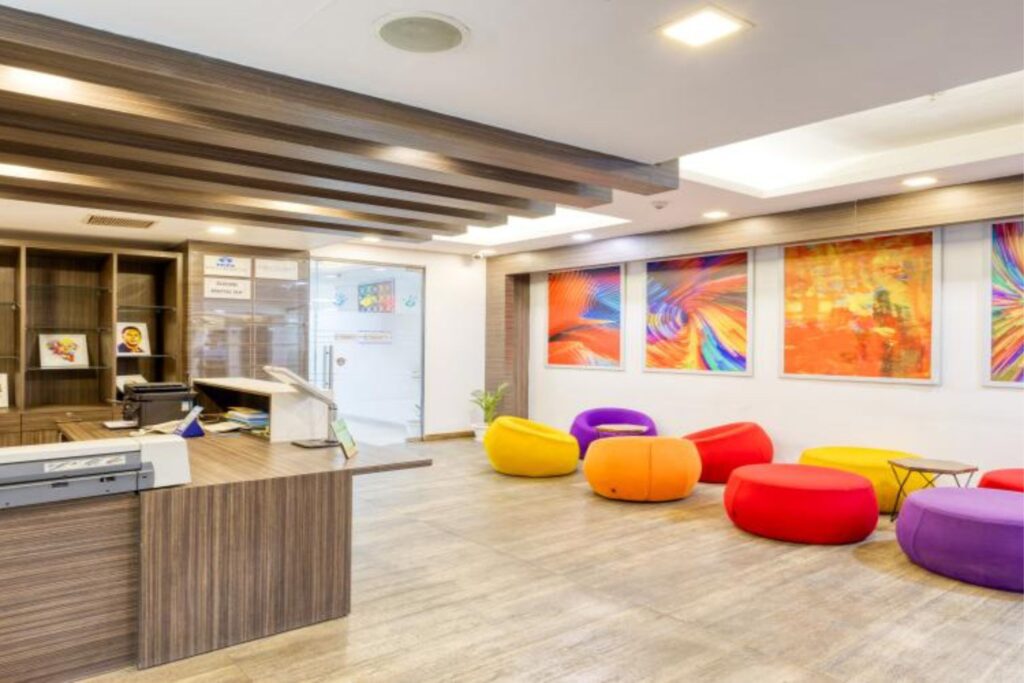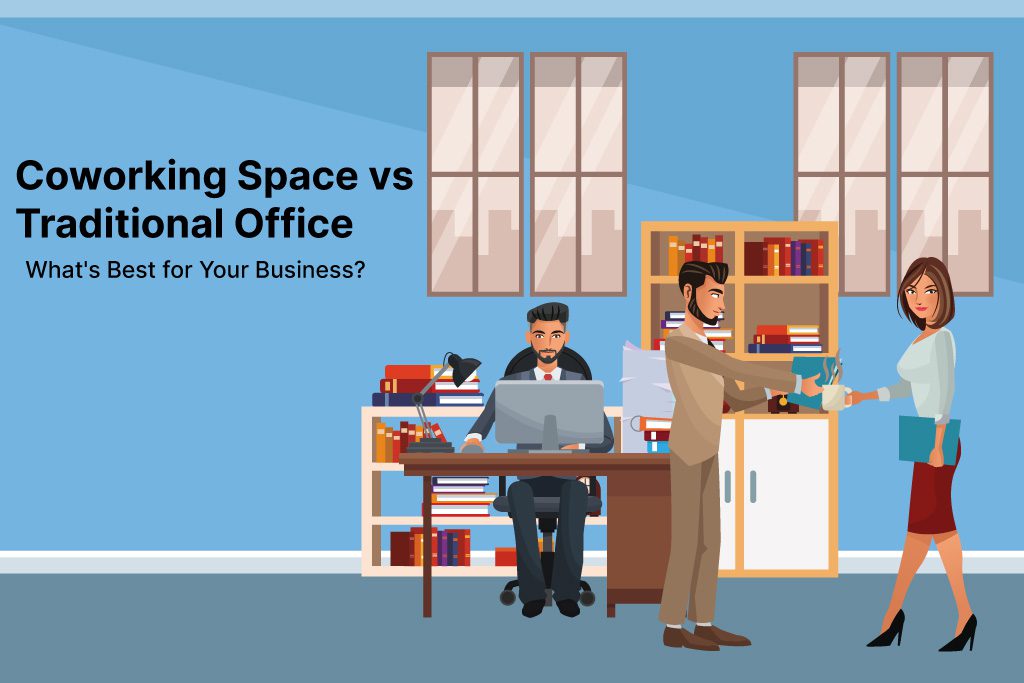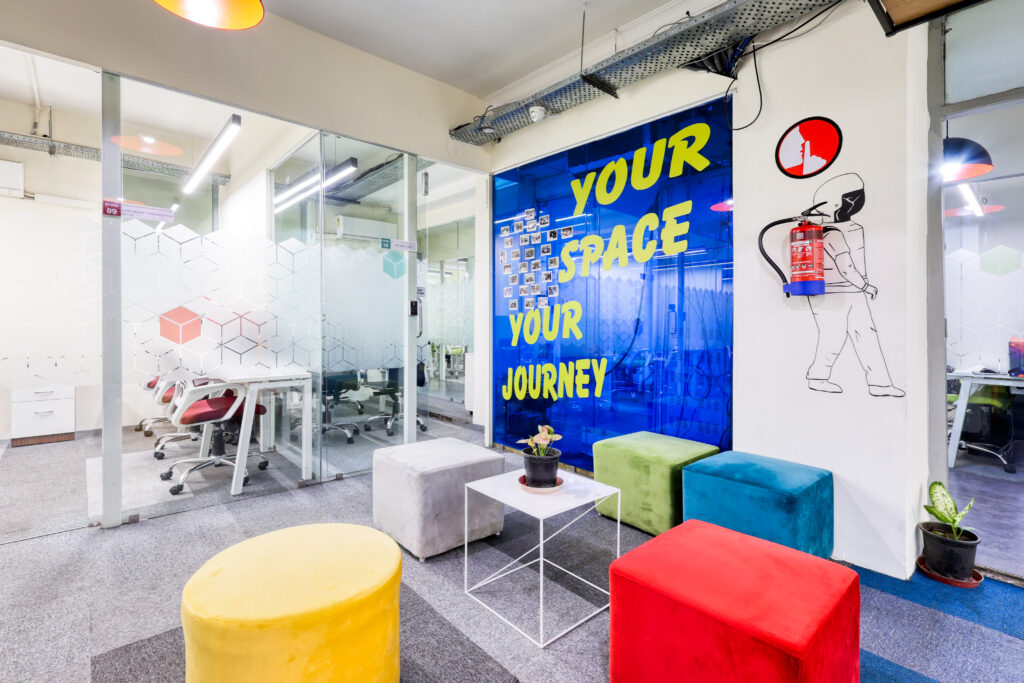Introduction
The way we work is changing rapidly, the debate between coworking spaces and traditional offices has gained significant traction.
As businesses are evolving and adapting to changing needs & trends,
As businesses evolve and adapt to changing needs and trends, the question arises: which workspace model is best for businesses? It’s not a one-size-fits-all answer.
But which is better? Here things get interesting. For some businesses, a traditional office provides the stability & privacy necessary for focused work and team cohesion.
On the other hand others prefer coworking spaces for collaboration, networking opportunities & creativity.
In this blog, we will explore the pros and cons of each workspace model based on the factors such as cost, culture, flexibility, and productivity.
What are Traditional Offices?

Traditional offices are dedicated spaces owned or leased by a single company & can range from single small offices to large corporate offices.
The environment of traditional offices is very structured & facilitates face-to-face interactions among employees. Traditional offices provide stability & routine with dedicated space for meetings, brainstorming sessions & individual tasks.
While they offer privacy and control over the work environment, they may lack the flexibility and dynamism found in alternative workspace models like coworking spaces.
What are Coworking Spaces?

Coworking spaces are shared spaces in which individuals from different companies come together to work. Coworking spaces provide a variety of amenities like fast wifi network, power backup, private conference room, hangout zone & more.
The atmosphere in coworking space is characterized by a vibrant community and dynamic energy.
Click “What are coworking spaces?” for detailed information.
Traditional Office vs Coworking Space

Flexibilities
Flexibility in the workspace distinguishes traditional offices from coworking spaces.
In a traditional office flexibility is limited with fixed work hours, assigned desks, and tight structures. Employees usually follow a set schedule and work within designated space giving stability but limiting creativity.
On the other hand coworking spaces provide flexibility allowing members to choose when and where they work. Coworking spaces provide options like hot desks, private offices & flexible memberships & accommodate diverse work styles. This flexibility helps individuals to create their ideal work environment, whether they prefer a quiet corner or a communal area.
Additionally, coworking spaces often offer amenities like 24/7 access, high-speed internet, and on-demand meeting rooms, further improving flexibility and convenience for members.
Networking Opportunities

In traditional offices, networking opportunities usually revolve around colleagues within the same company. Team meetings & company events provide chances to connect, share ideas, and build professional relationships within the organization.
While these interactions can be valuable for internal collaboration and career growth, they lack diversity in perspectives.
On the other hand coworking spaces offer a diverse ecosystem of professionals from various industries and backgrounds. Here there are high chances of networking as members often interact with each other on a regular basis, attend networking events & collaborate on projects. This diverse community helps in networking cross-industry connections & might open doors to potential partnerships beyond the confines of a single company.
Cost Efficiency

Cost plays an important role in differentiating Traditional & coworking spaces.
Traditional offices involve long-term leases, extra costs like utilities and maintenance, and the need to furnish and equip the space. These might seem as extra expenses especially for startups experiencing financial fluctuations.
On the other hand, coworking spaces operate on membership or subscription basis to suit different needs & budgets. This pay-as-you-go model eliminates the need for long-term lease and extra investments.
Additionally, coworking spaces also include amenities like high-speed internet & access to shared facilities like meeting rooms and kitchens in their membership fees, further reducing overhead costs for members.
Ultimately, the cost comparison between traditional offices and coworking spaces depends on factors such as location, space requirements, and desired amenities.
Work Environment

In a traditional office, the environment tends to be more structured and predictable. Traditional or private offices provide private space for focused work & meeting rooms offer designated areas for collaboration.
The office atmosphere is a reflection of the culture & policies set by the organization.
On the other hand, coworking spaces offer a more dynamic and flexible environment. With open layouts, hot desks, and communal areas, they encourage interaction and collaboration among members from diverse backgrounds.
The coworking space is vibrant & energizing with networking events and social activities contributing to it.
Amenities & Services

Traditional offices usually provide basic amenities like desks, chairs, meeting rooms, and maybe a kitchen. They may offer additional services like IT support & cleaning services.
However, the range of amenities can vary depending on the size and budget of the company.
On the other side, coworking spaces offer a wide range of amenities, including high-speed internet, printing & scanning facilities, comfortable furniture & access to advanced meeting rooms with latest audiovisual technology.
Additionally, some top coworking spaces may provide nap pods & event spaces for workshops and networking events.
Privacy Concerns
In a traditional office you will have privacy through private or enclosed spaces.
Employees have their own space to focus without distractions, can hold private meetings, & handle sensitive tasks.
However, this setup can sometimes lead to isolation and a lack of interaction among employees.
Conversely, coworking spaces promote collaboration and community but may sacrifice some privacy. With open seating arrangements & shared amenities, conversations and activities are more visible and audible.
While this promotes networking and idea exchange, it can also pose challenges for tasks requiring intense concentration.
Distractions
There is no doubt that coworking offers energetic unstructured communal settings which can be both helpful and distracting. The presence of other professional co workers might sometimes hinder concentration & productivity.
In traditional offices, distractions are limited to the company’s environment itself. On the flip side coworking spaces have their own distractions. Socializing with other coworkers might sometimes pull focus away from the tasks, making it a challenge to concentrate.
Conclusion
Ultimately, choosing between a coworking space and a traditional office depends on various factors such as your business’s size, culture, flexibility needs, and budget.
We have also showcased why choosing coworking space is beneficial supported by real life examples to illustrate our points.
By carefully looking at the pros and cons of each option you can choose which workspace model best suits your business.
For more information on coworking space contact Execube Cowork today!
FAQs
Why is coworking better than Traditional office space?
Coworking offers a range of benefits over traditional offices.
Firstly, it fosters a dynamic and collaborative environment where professionals from diverse backgrounds can interact & work on similar projects. Additionally, coworking spaces provide flexibility in terms of workspace options.
Coworking space provides amenities like high-speed internet, meeting rooms & communal areas.
What are the advantages of Traditional workspaces?
Traditional offices help in making stability and routine with designated work areas & fixed work hours. This structured environment increases focus and productivity, particularly for tasks that require concentration. Privacy is also maintained in traditional offices with individual offices.
In traditional offices, sensitive information and confidential tasks can be managed more efficiently.
Who benefits from working in a coworking space?
Coworking spaces are beneficial to a wide range of professionals. Freelancers and independent contractors can benefit from the flexibility and resources provided by coworking spaces.
Remote workers can also find coworking spaces advantageous, as they provide a dedicated workspace promoting work-life balance & productivity.
How are coworking spaces ideal for entrepreneurs?
There are multiple benefits for entrepreneurs working in a coworking space. In coworking space provides a supportive community of like-minded individuals. Here you have the opportunity to network, mentorship and even collaboration potential.
In coworking space entrepreneurs will have support, flexibility & resources they need to succeed in their field.


